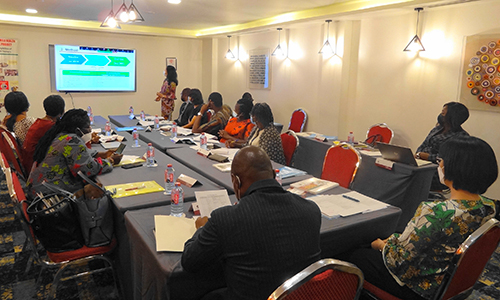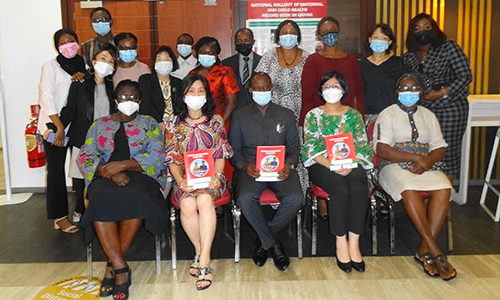- Home
- Technical Cooperation Projects
- Index of Countries
- Africa
- Ghana
- Project for Improving Continuum of Care for Mothers and Children through the introduction of Combined MCH Record Book
- Project News
- The Fifth Joint Coordination Committee meeting was conducted
Project News
2021-12-01
The Fifth Joint Coordination Committee meeting was conducted
The fifth Joint Coordination Committee meeting was organized on 30th November 2021 in Accra. The meeting brought 18 participants from Ghana Health Service (GHS) headquarter, Ashanti Regional Health Directorate, JICA Ghana office, and the project. The main agenda of the meeting was to review the progress and the achievement of the project and discuss the sustainability issues and plans way forward after the completion of the project.
Dr. Kofi Issah, Director of Family Health Division, GHS, Project Manager, gave a brief welcome address and stated the objectives for the meeting. Dr. Issah welcomed the Ashanti Regional Team to participate in this JCC and congratulated them on their achievements in the Region.
Dr. Patrick Aboagye, Director-General, GHS/Project Director, appreciated the achievements and hard work of the project and stated that MCH Record Book (MCH RB) has become an integral part of Ghana's health sector and beyond the health sector and that the government should sustain the MCH RB program.
OZAWA Maki, Senior Representative of JICA Ghana Office, reviewed the history of the project from the development of the MCH RB to its national roll-out, commended the GHS for its consistent initiative and leadership in leading the project, and expressed his gratitude to the project experts for their hard work and wished for a meaningful discussion at the meeting for the future sustainability.
Catherine Adu-Asare (Ghana MCH RB Project) and Dr. Akiko Hagiwara (Chief Advisor, Ghana MCH RB Project) presented the activities conducted and the achievement of the indicators related to the Project Design Matrix (PDM), and the update of the management guide. Olivia Timpo, Reginal Nutrition Officer, Ashanti Region, presented their experiences in Ashanti Region.
Major Achievements of the project were:
- The project supported GHS to train 939 facilitators and 1642 health workers across the country. The project also supported facilitators to conduct monitoring and supervision nationwide.
- As a result, the MCH RB is utilized at all health facilities. High-quality maternal and child health and nutrition services were provided and accessible throughout the country. Health workers provided counseling on MCH and Nutrition by utilizing the personal health records and illustrations in the MCH RB and promoted better understanding and behaviors related to MCH and Nutrition among mothers.
- Delivery and PNC for mothers and children were recorded better on MCH RB. 83% of MCH RB had the date of birth and weight at birth at national M&S. PNC records, such as uterus size after delivery, improved from 24% to 46% nationwide, and 77% at focus 11 districts.
- Length/Height measurement for a child started nationwide with the introduction of MCH RB. Measurement of length/height of children was "done well" at 86% of health facilities nationwide and 98% in focus districts.
- The positive experience of care was promoted with the Dear Mother approach. 81% of mothers received nutrition counseling at ANC and/or CWC. More than 90% of mothers nationwide felt free to ask questions during the counseling, and more than 90% of mothers can recall what the health provider suggested at the counseling. 72% of facilities had some measures to secure privacy for counseling.
- Continuum of Care (COC) was promoted and 92% of mothers and children in focus 11 districts received all COC services (ANC4+, SD, PNC3).
Major issues discussed were:
1) National coordination mechanism of MCH RB Program
The coordination of the rollout of the MCH RB must be integrated into existing technical coordination structures within the maternal, child health, and nutrition programs. The Family Health Division under the leadership of the DG will coordinate and collaborate with relevant departments, divisions, partners, and MMDAs to ensure smooth implementation with the existing Child Health and Newborn Technical Working Group serving as the secretariat. Key issues arising from the implementation will be tabled by the Secretariat through the Director of Family Health to the appropriate technical committee for review and coordination. GHS will continue to coordinate with NHIS, Ministry of Health and the Ministry of Finance for the printing of MCH RB with the national budget.
2) Monitoring and Supervision
The importance of the three different levels of monitoring was proposed.
- Program-specific M&S is for the national and regional facilitators to monitor and coach technical skills.
- Integrated M&S is to capture snapshots of ongoing activities together with other related programs
- On-the-job coaching and mentoring are for the facility in charge to monitor as a part of routine work
3) Periodical Revision of MCH RB
Vertical programs related to maternal and child health and nutrition, as well as at regional levels, will make recommendations for the revision of the MCH RB which will be further examined by the GHS and the Child Health Subcommittee. The revision is expected to take place over five years.
The project members are grateful for the strong leadership of the GHS counterpart to lead the concreate and realistic discussion for the sustainability of the MCH RB program. We will continue the dialogue with all regional health teams and partners at the Dissemination Seminar.
 Discussion at the 5th JCC meeting
Discussion at the 5th JCC meeting
 Discussion at the 5th JCC meeting
Discussion at the 5th JCC meeting
 Group Photo of the participants at the 5th JCC meeting
Group Photo of the participants at the 5th JCC meeting
- About JICA
- News & Features
- Countries & Regions
- Our Work
- Thematic Issues
- Types of Assistance
- Partnerships with Other Development Partners
- Climate Change / Environmental and Social Considerations
- Evaluations
- Compliance and Anti-corruption
- Science and Technology Cooperation on Global Issues
- Research
- JICA Development Studies Program / JICA Chair
- Support for the Acceptance of Foreign HRs / Multicultural and Inclusive Community
- Publications
- Investor Relations
